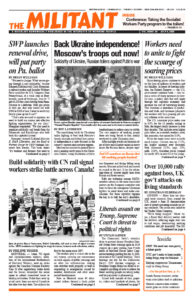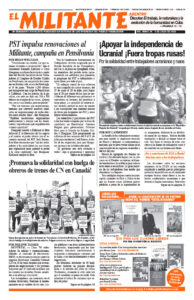Putin’s war on Ukraine is having a ripple effect in the Middle East, including weakening Moscow’s forces in Syria. Along with Tehran-backed militias, the Russian intervention is essential to propping up the dictatorship of Bashar al-Assad. This is intensifying the rivalry between capitalist regimes from Iran to Turkey as they jockey to advance the defense of their interests in the region. It has also led the Israeli rulers to step up efforts to prevent the counterrevolutionary regime in Iran from developing nuclear weapons.
Along with Moscow’s air power, which is key to protecting Assad’s dictatorial rule, there have been as many as 63,000 Russian troops in Syria. Many now play support, not combat, roles.
The Moscow Times — a daily online publication that opposes the regime of Vladimir Putin in Russia — recently reported that Moscow withdrew several military units from Syria and abandoned some bases there to reinforce its battered and demoralized forces in eastern Ukraine. These moves have also been reported in the Guardian.
The Jerusalem Post noted June 12 that even if Moscow is “distracted” by the Ukraine war, there is no chance that Putin is pulling out of Syria, citing Moscow’s need to ensure use of the port of Tartus to access the Mediterranean Sea and its broader interests in the region.
The Post shares the concern of many Arab regimes that the bourgeois clerical rulers in Iran would benefit most from a reduced Russian presence. The paper warned that there are “reports that Iran was already taking advantage of Russia’s preoccupation with the war in Ukraine to expand into south and central Syria.”
On June 12 Aleksandr Yefimov, Russia’s ambassador to Damascus, told Syria’s Al-Watan newspaper that any changes in deployments there are routine and have nothing to do with Ukraine.
Ankara threatens to move in
The Turkish government is also hoping to take advantage of Moscow’s “distractedness.” Turkish President Recep Tayyip Erdogan threatened June 1 to launch a major offensive against areas of Syria along Turkey’s border controlled by the Kurdish-led Syrian Democratic Forces, which has been backed by both Washington and Moscow. Ankara has begun massing troops there. Erdogan stated that he wants to create a 20-mile “security zone” by pushing the SDF further south. The SDF backs the national rights of the Kurdish people, who are a majority in northern Syria.
There are more than 40 million Kurds in the Middle East, including in Iran, Iraq, Syria, Turkey and Armenia. They comprise the world’s largest population without their own state. The Turkish rulers worry that any advance for the Kurds in Syria will boost the fight of the some 20 million Kurds in Turkey for their rights.
Both Moscow and Washington demanded that Erdogan back off from his threats to invade. In response, Erdogan scaled back his threats, saying he plans to focus on targeting the towns of Manbij and Tal Rifaat.
Washington still has some 900 U.S. soldiers in northeast Syria, who carry out joint patrols with the Kurdish-led SDF, and protect U.S. interests in Syria’s oil fields that the SDF controls.
Nubul and Zahraa, just to the south of Tal Rifaat, are controlled by Tehran-backed Shiite militias.
Since the start of Tehran’s intervention in the civil war in Syria, the country has become a major transit point for all kinds of weapons to Hezbollah in Lebanon and beyond. In an effort to keep a hand in with all the contending forces intervening in Syria, Moscow turns a blind eye to increasingly frequent Israeli government bombing attacks on Iranian-backed forces in Syria.
Asserting that Tehran has been smuggling satellite navigation systems on passenger flights, Israeli Air Force planes struck the international airport in Damascus twice in the last month, causing major damage to the runways and forcing the cancellation of all flights until at least June 20. These GPS devices can make rockets aimed at Israel much more accurate and deadly.
The Russian Foreign Ministry in Moscow registered a protest over the attacks by summoning Israel’s ambassador, telling him that it needed clarification “within the framework of the existing Russian-Israeli mechanism to prevent dangerous incidents in Syria.”

